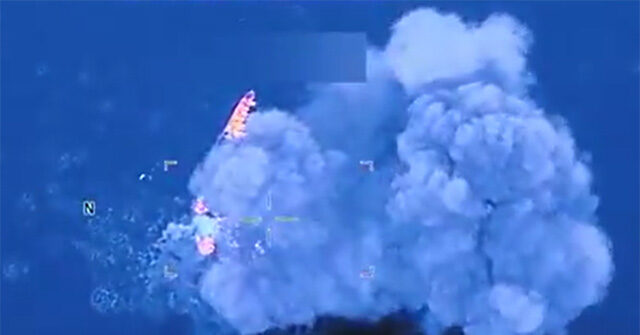Secretary of War Pete Hegseth confirmed on Sunday that the U.S. military conducted what he called a “lethal kinetic strike” on a suspected narco-vessel in the Caribbean Sea that he associated with Colombia’s National Liberation Army (ELN), a Marxist terror organization.
The ELN is one of the most powerful Marxist terrorist groups in Colombia, alongside the Revolutionary Armed Forces of Colombia, or FARC. Both groups largely sustain their operations – which involve the conquest of rural territory, assassination and threats of local conservative politicians, and association with other international terrorist entities – through drug trafficking, particularly cocaine. At their peak, the FARC were the world’s wealthiest terrorist organization, making more money that al-Qaeda, the Taliban, and Boko Haram combined, according to a 2014 study. Two years later, the FARC signed a “peace deal” with the Colombian government that preceded an even larger cocaine boom in the country.
Under current President Gustavo Petro, himself a member of the M19 Marxist terror guerrilla as a youth, cocaine production in Colombia and, as a result, around the world, has skyrocketed to record levels even beyond those of 2016, according to studies by the United Nations Office on Drugs and Crime (UNODC). Petro has repeatedly condemned the United States for activities intended to contain the threat of narco-terrorism emanating from his country.
The operation Hegseth revealed on Sunday, which he noted took place on Friday, is one of several similar engagements by the armed forces of the United States to limit the nefarious impact of narco-terrorism throughout the continent. President Donald Trump has empowered U.S. Southern Command to target and eliminate drug traffickers in international waters to curb the abundant production and import of cocaine and other illicit substances into the United States. Cutting the illegal drug supply in America, Trump has repeatedly argued, not only protects Americans but denies terrorist groups such as the ELN, and allies such as the socialist regime in Venezuela, of much-needed profits.
Hegseth specified that the targeted of the later operation was an unspecified vessel “known by our intelligence to be involved in illicit narcotics smuggling.” It was identified “along a known narco-trafficking route” carrying “substantial amounts of narcotics,” he added.
The U.S. military bombed the vessel and killed three men on board, whom Hegseth identified as terrorists.
“These cartels are the Al Qaeda of the Western Hemisphere, using violence, murder and terrorism to impose their will, threaten our national security and poison our people,” Hegseth wrote. “The United States military will treat these organizations like the terrorists they are — they will be hunted, and killed, just like Al Qaeda.”
Using counter-terrorism tactics in Colombia that were once pioneered in the Middle East was first developed as a strategy under the presidency of Álvaro Uribe Vélez, still one of Colombia’s most beloved politicians decades later. Uribe engaged the administration of then-President George W. Bush to use traditional American counter-terrorism strategies, rather than traditional policing, to subdue the FARC and ELN, and dramatically curtailed the terrorists’ influence. The groups managed to regenerate in the aftermath of the 2016 “peace deal,” which won Colombian ex-President Juan Manuel Santos the Nobel Peace Prize.
Petro, the current Colombian president, condemned Hegseth immediately for his announcement, claiming that the vessel the U.S. military targeted was not a narco-terrorist entity. Instead, Petro alleged, it was a fishing vessel belonging to a “humble family who love the sea.”
“What do you say to that family?” Petro said in an extended message published to the social media site Twitter. “Explain to me because you helped murder a humble fisherman in Santa Marta, the land where [Simón] Bolívar died, and that people say is the heart of the world.”
Petro’s opposition to anti-drug operations – and his public support of cocaine use, coupled with accusations of his own drug addiction – has severely frayed U.S.-Colombia relations, once thriving under Uribe and his successors. President Trump, whose administration revoked Petro’s visa to enter America after he called for the U.S. military to disobey its commander in chief in New York, announced on Sunday that he would begin canceling financial assistance for Colombia under Petro.
“Petro, a low rated and very unpopular leader, with a fresh mouth toward America, better close up these killing fields immediately, or the United States will close them up for him, and it won’t be done nicely,” Trump warned in a message on Truth Social on Sunday, announcing an end to American aid. Trump referred to Petro himself as an “illegal drug leader.”
Petro fired off his own social media message shortly thereafter, calling Trump “rude and ignorant.”
“I don’t do business like you. I am a socialist,” Petro proclaimed, addressing Trump.
On Monday, Petro conceded that the previously existing free trade agreement between Colombia and America was “de facto” suspended as Trump had attempted to renegotiate America’s business relations with Colombia, as he has done with every other country that trades with the United States, but Petro has been reticent to negotiate.
Follow Frances Martel on Facebook and Twitter.
Read the full article here
